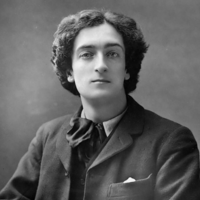My Maiden Vote
(TO JOHN FRASER)
There, in my mind’s-eye, pure it lay,
My lodger’s vote! ’Twas mine to-day.
It seemed a sort of maidenhood,
My little power for public good,—
Oh keep it uncorrupted, pray!
And, when it must be given away,
See it be given with a sense
Of most uncanvassed innocence.
Alas!—but few there be that know’t—
How grave a thing it is to vote!
For most men’s votes are given, I hear,
Either for rhetoric or—beer.
A young man’s vote—O fair estate!
Of the great tree electorate
A living leaf, of this great sea
A motive wave of empire I,
On this stupendous wheel—a fly.
O maiden vote, how pure must be
The party that is worthy thee!
And thereupon my mind began
That perfect government to plan,
The high millennium of man.
Then in my dream I saw arise
An England, ah! so fair and wise,
An England generously great,
No selfish island, but a state
Upon the world’s bright forehead worn,
A mighty star of mighty morn.
And statesmen in that dream became
No tricksters of the petty aim,
Mere speculators in the rise
Of programmes and of party cries,
Expert in all those turns and tricks
That make this senate-house of ours,
Westminster, with its lordly towers,
The stock-exchange of politics.
But that ideal Parliament
Did all it said, said all it meant,
And every Minister of State
Was guileless—as a candidate.
Statesmen no more the tinker’s way
Mended and patched from day to day,
Content with piecing part with part,
But took the mighty problem whole,
Beginning with the human heart:
For noble rulers make in vain
Unselfish laws for selfish men,
And give the whole wide world its vote,
But who is going to give it soul?
And then I dreamed had come to reign
True peace within our land again;
Not peace that rots the soul with ease,
Or those ignoble 'rivalries
Of peace’ more murderous than war,
But just the simple peasant peace
The weary world is waiting for.
With simple food and simple wear
Go lots of love and little care,
And joy is saved from over-sweet
By struggle not too hard to bear.
So dreamed I on from dream to dream,
Till, slow returning to my theme,
Upon my vote I looked again—
To whom was I to give it then?
That uncorrupted maidenhood,
My little power for public good.
What party was there that I knew
That I might dare intrust it to,
A perfect party fair and square—
My House of Commons in the air?
Though called by many different names,
Each one professed the noblest aims;
Should all be right, ’twas logical
That I should give my vote to all!
And then, of parties old and new
Which one, if only one, were true?
The divination passed my skill,—
My maiden vote is maiden still.

